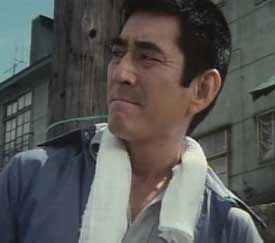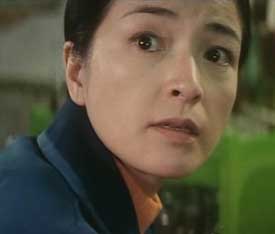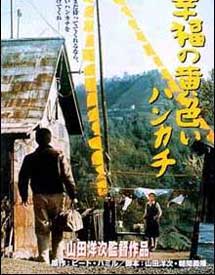 Ken Takakura is Yusaku Shima, just parolled after serving his time for murder, & making his way home to Hokkaido uncertain whether or not he will be welcome, or whether he should "stay on the bus, forget about us," for the inspiration of the story was, of all things, Tony Orlando's song "Tie a Yellow Ribbon Round the Old Oak Tree," & an American short story by Peter Hamill. Ken Takakura is Yusaku Shima, just parolled after serving his time for murder, & making his way home to Hokkaido uncertain whether or not he will be welcome, or whether he should "stay on the bus, forget about us," for the inspiration of the story was, of all things, Tony Orlando's song "Tie a Yellow Ribbon Round the Old Oak Tree," & an American short story by Peter Hamill.
Director Yoji Yamada had been doing episodes of the ultra-popular Tora-san series & the parallels between The Yellow Handerchief (Shiawase no kiiroi hankachi, 1977) & Tora-san's road-comedies are numerous, though this is a more serious version by far. Tora-san was a goodhearted wandering salesman & great disappointment to his family despite that they loved him. He was slow-witted & not quite capable of fitting into the modern world. And episode upon episode of the longest-running film series in the world, he remained forever very amusing. The Yellow Handerchief would seem to ask "what if Tora-san had been thoughtful & full of regret instead of clownish & borderline retarded?"
"Heartwarming" underestimates this film which is the perfect blend of humor & heartbreak & triumph. Three strangers' lives intersect as Tetsuya makes his way to his wife Mitsue (Chiezo Baisho, best known for her recurring role as Tora-san's sister). Adventures in transit are infused with worry & longing about the journey's end.
 The Japanese Academy Awards began in 1977 & The Yellow Handkerchief was the award's very first recipient for Best Picture. Plus it received awards best supporting actor (Tetsuya Takeda providing touching comic relief along the road), best supporting actress (Kaori Momoi in a sweetly powerful performance), Best Director & Best Screenplay both to Yoji Yamada, & Best Actor to Ken Takakura. The Japanese Academy Awards began in 1977 & The Yellow Handkerchief was the award's very first recipient for Best Picture. Plus it received awards best supporting actor (Tetsuya Takeda providing touching comic relief along the road), best supporting actress (Kaori Momoi in a sweetly powerful performance), Best Director & Best Screenplay both to Yoji Yamada, & Best Actor to Ken Takakura.
It swept the Kinema Junpo Awards & Mainichi Film Concours while it was at it.
Ken Takakura had spent the 1960s making ninkyo-eiga "chivalrous gangster" films one after another, & became the nation's biggest star.
When the fad for such intensely romanticized yakuza characters had passed, some of the biggest stars found themselves unable to shift into any other type of film. Some moved into television work, too frequently no better work than talk-show spots or commercials.
A few like Bunta Sugawara transitioned into the tougher more exploitative type of yakuza film that persisted after the decade of ninkyo films was over. Many wondered at that time if "the Japanese Ken" would survive the collapse of the film industry in general & of chivalrous yakuza films in particular.
Yellow Handkerchief proved his star power was not genre-specific. True, he's once again an ex-con who once killed, but there is no gangsterism in this very human, quiet tale of a man who made one enormous error in his life & does not yet know if he will ever be able to reclaim the life of dignity & affection he once possessed.
It's a great movie & even "down-market viewers" who always delighted in seeing Ken with yakuza longsword & full body tattoos will appreciate this beautiful, artful film which stood for many years as the highwater mark for Yoji Yamada's career, until he directed Twilight Samurai (2002) & exceeded his own high standard.
copyright © by Paghat the Ratgirl
|

